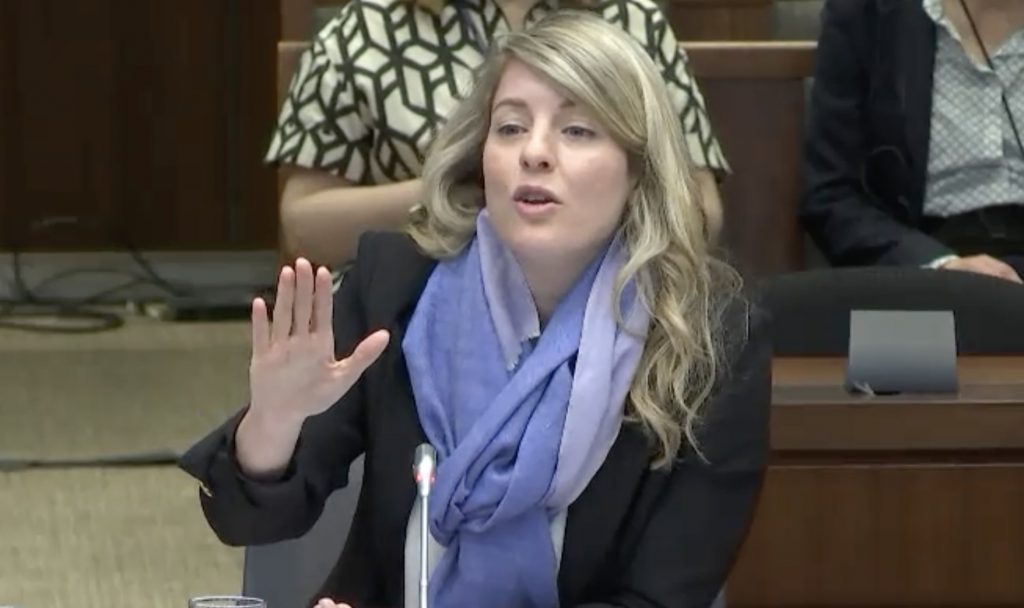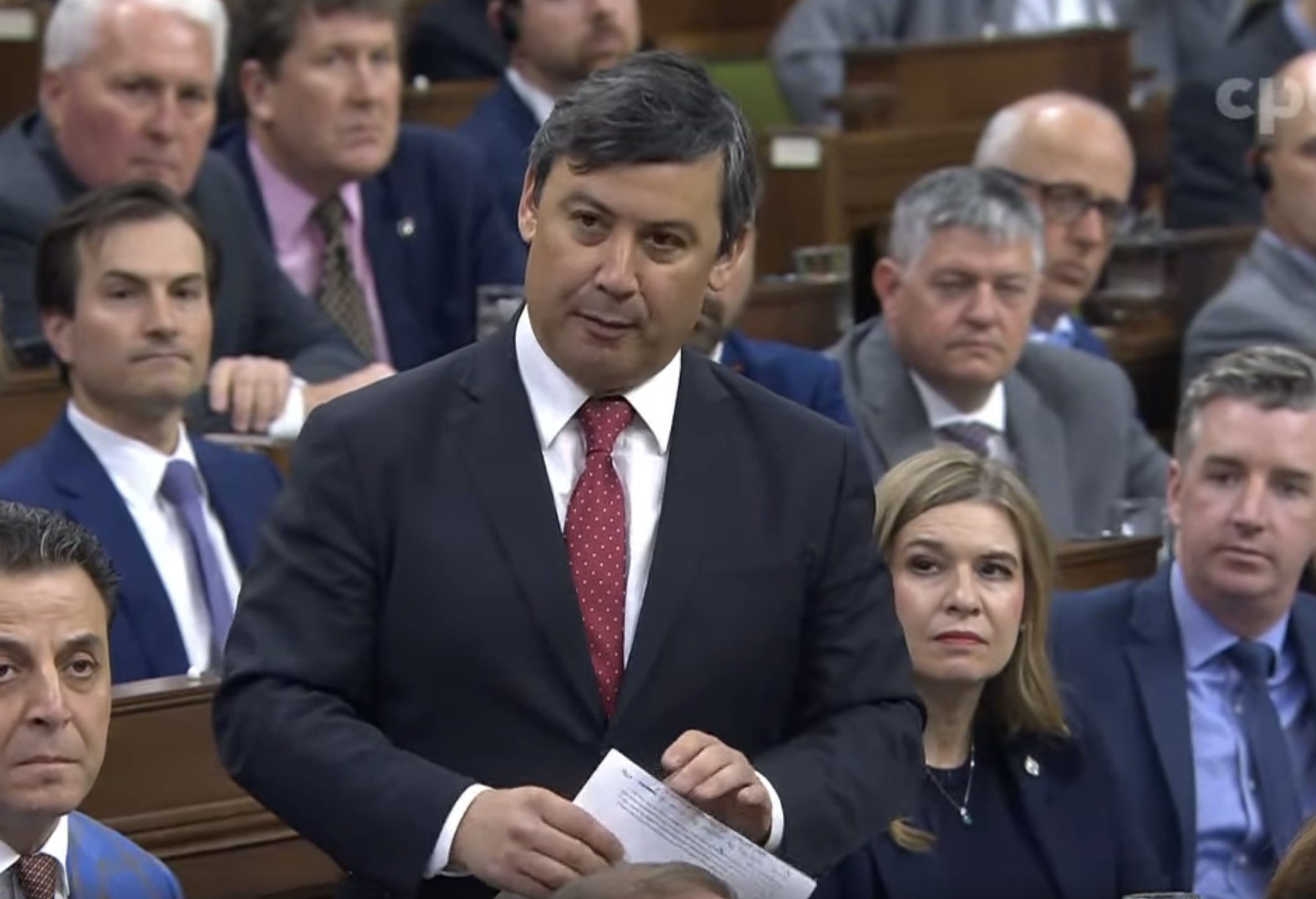OTTAWA – People’s Republic of China (PRC) diplomat Zhao Wei, who works out of the Chinese consulate in Toronto, has been declared “persona non grata” as of May 8, according to a statement from foreign affairs minister Mélanie Joly.
The Latin term essentially means unwelcome, and is used in the Vienna Conventions on Consular and Diplomatic Relations referencing the declaration of a foreign state’s consular officer as not being acceptable.
“This decision has been taken after careful consideration of all factors at play,” Joly’s statement read.
Canada has decided to declare persona non grata, Mr. Zhao Wei. pic.twitter.com/rZXeNTtdV4
— Mélanie Joly (@melaniejoly) May 8, 2023
The diplomat reportedly worked to gather information, not only on Wellington-Halton Hills MP Michael Chong, but his extended family in Hong Kong too, according to reporting by the Globe and Mail last week that cited a top-secret report and an anonymous source.
Details were further revealed in the House of Commons in the days following the May 1 Globe story, solidifying information that the Canadian Security and Intelligence Service (CSIS) knew – without ever telling Chong, the prime minister or the prime minister’s chief of staff – about the PRC’s gathering of information on Chong and his extended family in Hong Kong in the interest of imposing sanctions on them in 2021.
(Chong was sanctioned by Beijing in 2021 following his successful motion to recognize China’s treatment of Muslim minorities as genocide.)
The revelations became a fiery partisan issue and boiled over in the House last week as lawmakers shouted questions, accusations and insults across the isle.
Speaking to the Advertiser last week, Chong said CSIS never briefed him about a specific threat to him or his family, but the agency had provided him with general defence briefings in the past.
By the afternoon of May 2, Chong had received a briefing on declassified information from CSIS head David Vigneault about the PRC’s gathering of information on his family two years ago.
The government has not made any details of what the briefing contained available to the public, nor has Chong detailed what exactly he was told regarding the actions of the PRC or Zhao.
Chong has said he was briefed on “serious, grave details” about “intimidation operations.”
Statements from the Chinese Consulate in Toronto have called the reports “groundless.”
Speaking to reporters in Ottawa ahead of a caucus meeting on May 3, Prime Minister Justin Trudeau said that going forward, reports about foreign interference must be escalated to senior government levels, and claimed CSIS intelligence regarding Chong and his family was never briefed “up out of CSIS.”
But around an hour before Question Period began the following day, on May 4, Chong received a phone call from Jody Thomas, the prime minister’s national security advisor, contradicting Trudeau’s statement.
According to Chong, Thomas said the intelligence had in fact reached the government’s Privy Council Office in 2021, but the prime minister and his chief of staff were never told of it.
Foreign Affairs Minister Mélanie Joly told the Commons on May 4 that PRC Ambassador Cong Peiwu had been summoned by her deputy minister, and the government was “assessing all the interests” at stake.
“We know … that when it comes to the PRC, it will take action that will have an impact on our diplomatic, consular and economic interests,” Joly said.

Foreign Affairs Minister Mélanie Joly speaks to Wellington-Halton Hills MP Michael Chong during a committee meeting on May 4. (ParlVu livestream photo)
The minister’s comments in the House followed a tense back-and-forth earlier that day between her and Chong during a Foreign Affairs and International Development committee meeting.
“You have given accreditation to the diplomat here who is using his diplomatic immunity to target not just me and my family, but other members of parliament,” Chong said with obvious frustration in his voice.
On May 8, repeated calls in the House from Conservative Party members to expel Zhao resumed.
“There are steps that need to be taken, always, if you are going to expel a diplomat,” responded Robert Oliphant, Liberal MP and foreign affairs parliamentary secretary.
Canada last sent diplomats packing five years ago, when four Russian intelligence officers and diplomats were expelled in solidarity with other countries in 2018, in response to a nerve agent attack in the United Kingdom on a former Russian spy and his daughter.
On May 8, the Chinese Embassy in Canada released a statement in response to Joly’s decision to declare Zhao unwelcome in Canada.
It said the decision has “sabotaged” Sino-Canadian relations, and that China “will take resolute countermeasures.”
“We urge the Canadian side to step back from the brink and refrain from moving further down the wrong path,” the statement added.
China’s five-month ban of meat and a three-year ban on canola imported from Canada beginning in 2019 are widely thought to be moves in relation for Canada’s role in the 2018 arrest and detention of Huawei executive Meng Wanzhou on behalf of the U.S. The ban on Canadian canola ended just last year.
Speaking to reporters in London on May 7, Trudeau said Canada’s relationship with China has been challenged. He specifically noted arbitrary detention of Canadians and trade.
In her statement, Joly said, “we will not tolerate any form of foreign interference in our internal affairs.
“Diplomats in Canada have been warned that if they engage in this type of behaviour, they will be sent home.”
Speaking to reporters in Ottawa this week, Chong criticized the government for how long it took to act.
“We have known for years that the PRC is using its accredited diplomats here in Canada to target Canadians and their families,” he said.
Chong regularly visits with policy experts at the University of Toronto, he told reporters, “a mere two or three blocks from the PRC consulate on St. George Street,” he said.
“To realize in retrospect that that individual could have been monitoring what … I was doing is very disconcerting, and to know that the Government of Canada knew that, and failed to inform me about this individual, is equally disconcerting.”
Chong reiterated his calls for a foreign agent registry to be created, for better coordination between the RCMP and CSIS, and for the closing down of Chinese “police stations” in Canada (as reported on by CSIS in its recently released public report for 2022).
Chong’s calls to action echo those in a non-binding Conservative motion passed in the House on Monday, in a 170-150 vote, calling on the government to respond immediately to Beijing’s interference in Canada.
In a “reciprocal countermeasure” to Zhao being declared unwelcome, China’s Foreign Ministry spokesperson Wang Wenbin told reporters on May 9 that Canadian consular official Jennifer Lalonde has been declared “persona non grata” and told to leave China by May 13.
“We will not waver in our resolve to uphold China’s interests,” Wenbin said.
As a reciprocal countermeasure against Canada’s unscrupulous move, China has declared Jennifer Lynn Lalonde, consul of the Consulate General of Canada in Shanghai persona non grata, who has been asked to leave China no later than May 13. pic.twitter.com/gchCOWkCJQ
— Spokesperson发言人办公室 (@MFA_China) May 9, 2023
He warned that if Canada doesn’t act to China’s liking, “China will react firmly.”
The spokesperson stressed Chinese diplomatic and consular missions in Canada abide by Canadian law and international conventions.
Oliphant said during a May 8 appearance on CTV’s Power Play that Zhao is to leave Canada by May 13.
Global Affairs Canada did not respond to an inquiry from the Advertiser asking if Zhao has in fact left Canada.
According to the Vienna Convention on Diplomatic Relations, China must either recall Zhao to Beijing or terminate the official’s functions with its foreign mission in Canada.



